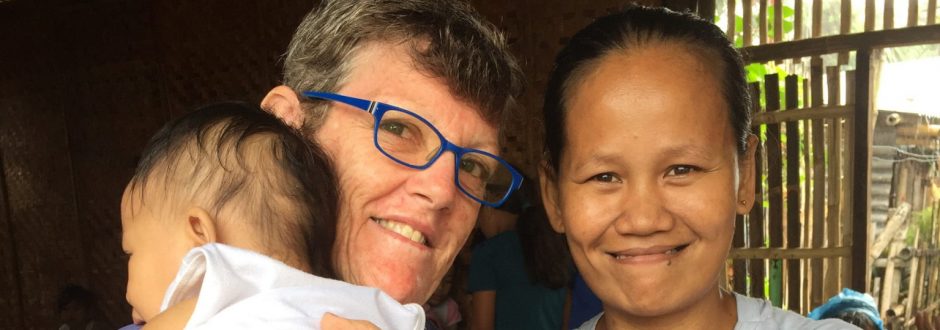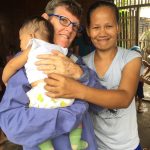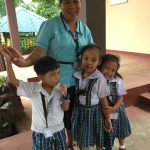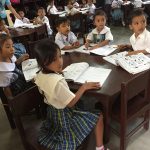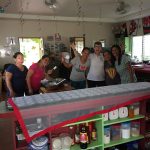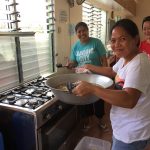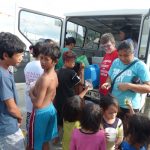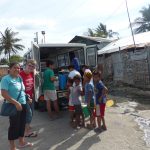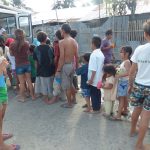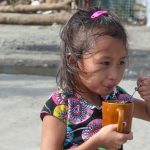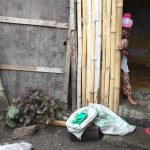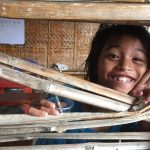Despite the challenges of life and ministry in this remarkable place, one thing was clear – the Good Sams serve with creativity, energy, humour and with love, writes Catherine Cresswell.
BY Catherine Cresswell
The first thing that struck me on arriving at Bacolod airport was the calm. After a long flight from Sydney via Manila, we had braced ourselves for the usual barrage of vendors and taxi scouts found in most South-East Asian cities. But there were none. It seemed this bustling city of over half a million people was not expecting visitors. The sight of two foreign women, each dragging a massive suitcase (filled with donated clothing for children living in the squatter settlements) aroused little more than curious glances.
As partners in ministry, Tracey Brown and I had come to stay with the Philippines-based Good Samaritan Sisters to learn more about their work. Above the heads of the dispersing travellers, we were delighted to see a long, fair-skinned arm waving to us. Moments later, Sister Anne Dixon (pictured above) was cheerfully shepherding us towards the distinctively-painted Good Sams van.
We drove past lush fields of sugarcane and rice, shaded by the jagged profile of the central mountains, before reaching downtown Bacolod. Sisters Grace Marcelo, Hiro Kageyama, Leonie Duenas, Germia Tocama and Anne Dixon live in community in two houses in the suburb of City Heights, a few minutes’ walk between them. They live simply and in sync with the rhythms of the local people. At the house in Amber Street where Tracey and I stayed, there is no hot water. If a shower is needed, water is pumped from the well in the backyard. If it rains, Anne said we should lift any valuables off the floor, as the house has a tendency to flood.
On our first morning I woke heavy-headed, the air thick and sticky as molasses. Through my daze I heard the sound of angelic singing coming from the room next to mine. In the early morning light Germia and Anne were sharing morning prayers. I heard them ask God for the gift of “hands that serve”. I would soon understand what that meant.
Each day started early. The sisters were busy and each, including Hiro – who is nearly 88 years young – seemed undeterred by the challenges of daily living.
Germia and Leonie work at the Good Samaritan Kinder School, where a daily program is offered to 120 four-and-five-year-olds from nearby poor and squatter neighbourhoods.
On the day of our visit, the children greeted us joyfully, taking our hands to proudly show us their classrooms. We admired the beautiful and orderly environment; the books, whiteboard and play equipment. It was clear this was more than a place of education, it was a place of nurturing and of love.
Our visit to the Good Samaritan Outreach Centre, managed by Anne and Grace, was another eye-opener. The Centre provides a place where women are welcomed to develop new skills and livelihood opportunities. It is also where a daily meal is prepared for over 250 children living in the nearby squatter communities.
On the day of our visit, a group of mothers was preparing an enormous pot of nourishing noodle soup over a simple gas burner. This was packed up into large containers for the short journey to Boulevard, a squatter settlement of over 1,000 families clinging to the rubbish-strewn coast on the edge of Bacolod city.
As we arrived at Boulevard in the Good Sams van, children ran excitedly to greet us, clutching the small cups and pots into which their food would be served. They were especially excited because it was a Wednesday, the day they receive a cup of reconstituted powdered milk with their meal – a much-anticipated treat.
The families were keen to show us their homes, ingeniously constructed from bamboo and salvaged materials. There was no sanitation or running water. Some homes were built on bamboo stilts, directly over the water. The sound of creaking bamboo as we wove our way through the narrow walkways was a reminder of how vulnerable these homes are to the vagaries of tides and tropical weather.
The Japanese Good Sam sisters originally came to Bacolod as it is one of the poorest areas in the Philippine archipelago. Here close to 40 per cent of children live in poverty. People in squatter settlements such as Boulevard are some of the most impoverished and also live under threat of wholesale eviction. Many survive on less than $2 a day and struggle to afford the very basics of life. The sight of tiny, finger-sized bags of rice hanging for sale in the street stalls spoke of the daily reality of food poverty these families grapple with.
There was much more that we were invited to see and experience: a visit to the local orphanage with Grace and Anne; a meeting with Hiro to learn about the scholarship programs generously supported from Japan; Anne’s prison ministry – and more.
It seemed the energy of the sisters was almost boundless, and through it all, there were hugs, jokes and even the occasional song! The sisters were most animated when designing a new program or a way to make existing funds go further in support of those in need.
After a week it was time to leave Bacolod, marvelling at its extremes of beauty and poverty. Beyond gaining knowledge of the ministries, we had witnessed the love and friendship the sisters share with the local people. We’d shared the life of the sisters from three quite diverse nations and cultures – the Philippines, Australia and Japan.
Despite the challenges of life and ministry in this remarkable place, one thing was clear – the Good Sams serve with creativity, energy, humour and with love.
A donation to the Sisters of the Good Samaritan Foundation can help the Sisters continue their programs of assistance in Bacolod. Find out more
Click on a photo to view the photo gallery
Photo credit: Catherine Cresswell
- Image: Catherine Cresswell.
- The Good Sams have had a presence in Bacolod for more than 25 years. Image: Catherine Creswell / Sisters of the Good Samaritan.
